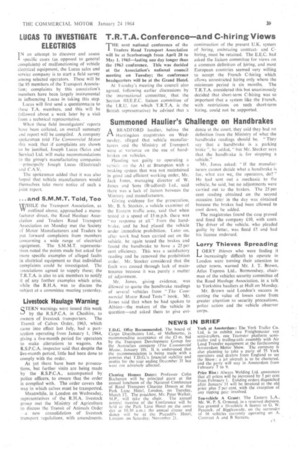LUCAS TO INVESTIGATE T.R.T.A. Conference
Page 41

If you've noticed an error in this article please click here to report it so we can fix it.
ELECTRICS
IN an attempt to discover and assess
specific cases (as opposed to general complaints) of malfunctioning of vehicle electrical equipment, the Lucas sales and service company is to start a field survey among selected operators. These will be the 95 members of the Transport Association; complaints by this association's members have been largely instrumental in influencing Lucas in taking this step.
Lucas will first send a questionnaire to these T.A. members, and this will be followed about a week later by a visit from a technical representative.
When these field investigators' reports have been collated, an overall summary and report will be compiled. A company spokesman told The Commercial Motor this week that if complaints are shown to be justified, Joseph Lucas (Sales and Service) Ltd. will make recommendations to the group's manufacturing companies –principally Joseph Lucas (Electrical) and C.A.V.
• The spokesman added that it was also hoped that vehicle manufacturers would themselves take more notice of such a joint report.
...and S.M.M.T. Told, Too
wimLE the Transport Association, as VI' outlined above, approached a manufacturer direct, the Road Haulage Association and Traders Road Transport Association on Monday met the Society of Motor Manufacturers and Traders to put forward complaints from members concerning a wide range of electrical equipment. The S.M.M.T.. representatives noted the points made but asked for more specific examples of alleged faults in electrical equipment so that individual complaints could be investigated. The associations agreed to supply these; the T.R.T.A. is also to ask members to notify it of any further examples which arise, while the R.H.A. was to discuss the subject at a committee meeting yesterday.
Livestock Haulage Warning
STERN warnings were issued this week by the R.S.P.C.A. in Cheshire, to
owners of livestock transporters. The Transit of Calves order, 1963, which came into effect last July, had a partsection operating from January 1, 1964, giving a five-month period for operators to make alterations to wagons. An R.S.P.C.A. inspector said that despite the five-month period, little had been done to comply with the order.
As yet there have been no prosecutions, but further visits are being made by the R.S.P.C.A., accompanied by police officers, to ensure that the order is complied with. The order covers the way in which calves must be transported.
Meanwhile, in London on Wednesday, representatives of the R.H.A. livestock group met the Ministry of Agriculture to discuss the Transit of Animals Order ---a new consolidation of livestock transport regulations, with amendments.
THE next national conference of the Traders Road Transport Association will be at Scarborough from April 28 to May I. 1965—lasting one day longer than the 1963 conference. This was decided at the Association's national council meeting on Tuesday; the conference headquarters will be at the Grand Hotel.
At Tuesday's meeting the council also agreed. following earlier discussions by the international committee, that the Section ill/E.E.C. liaison committee of the I.R.U. (on which T.R.T.A. is the British representative) be advised that a
and C-h Iring Views
continuation of the present U.K. system of hiring, embracing contractand Chiring, must be retained. The E.E.C. had asked the liaison committee for views on a common definition of hiring, and most European countries seemed very willing to accept the French C-hiring which allows unrestricted hiring only. where he minimum period is six months. The T.R.T.A. considered this but unanimously decided that short-term C-hiring was so important that a system like the French, with restrictions on such short-term hiring, could not be ,supported,
























































































































